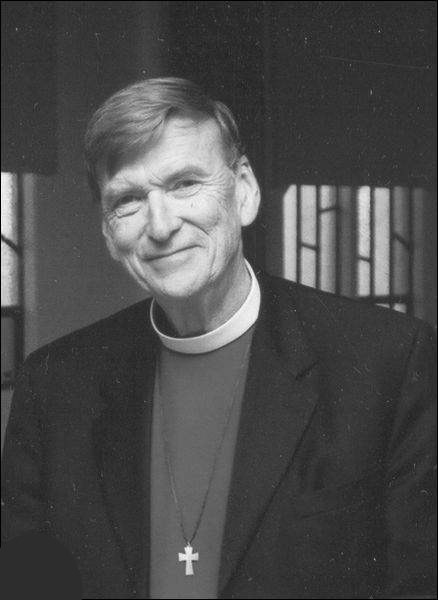By David Yonke
Toledo Blade [United States]
June 2, 2007
http://toledoblade.com/apps/pbcs.dll/article?AID=/20070602/NEWS10/706020367/-1/NEWS
Retired Episcopal Bishop John Shelby Spong doesn't flinch at being called a heretic, but asserts he is trying to make people rethink and, hopefully, save Christianity.
"I believe that I am witnessing the death of Christianity, as it has been historically understood," Bishop Spong writes in his provocative new book, Jesus for the Non-Religious (Harper San Francisco, $24.95).
"I had to fight with Harper for that title. I had to battle them," he told The Blade in a recent interview.
 |
| Bishop Spong |
The bishop insisted on the book's title because it accurately sums up his views that although Jesus was a pivotal figure in history, his life and his message have become obstructed by myths and outdated world views.
Bishop Spong believes that Jesus was "a man in whom God was fully manifested," but that Jesus was not divine, not born of a virgin, performed no miracles, and did not physically rise from the dead.
The bishop's rejection of orthodox Christian beliefs does not diminish the significance of Jesus' life in any way, he said. Rather, it frees Jesus from "the hysterically religious, the chronically fearful, the insecure, and even the neurotic among us."
Bishop Spong said his own faith has been strengthened by "stripping the superstitious barnacles" that have become attached to Jesus over the centuries, and by "separating the Jesus of history from the layers of interpretive material, from mythology, and from the miraculous claims that derived from a supernaturally oriented world."
"[Jesus] stands not only at the center of my faith, but also at the center of all that I am," he said.
The retired bishop of the Episcopal Diocese of Newark, N.J., remains in good standing with the 2.5-million member Episcopal Church, a fact that does not sit well with some of his fellow clergy.
"The faith he declares in his writing is totally non-Christian and heretical," said the Rev. Joseph Keblesh, rector of St. Matthew's Episcopal Church in West Toledo. "What he writes is contrary to the doctrines of Christianity, contrary to Christian teachings, and, quite frankly, contrary to the stated teachings of the Episcopal Church."
Bishop Spong, 75, said he felt compelled to write Jesus for the Non-Religious because Christianity needs an extreme makeover or it will become the casualty of "an expanded worldview."
"I've gotten to the place where I'm embarrassed by most of the public expressions of religion," he said. "When religion makes the news in America, it's because a priest abused a child or someone is suing over abuse, or because the male hierarchy is pontificating about what a woman should do with her body.
He was inspired by the writings of Dietrich Bonhoeffer, a Lutheran pastor and theologian from Germany executed in 1945 for participating in a plot to assassinate Hitler.
"He wrote letters and papers to Eberhard Bethge while in prison about what he saw as a vision for the Christian future, and spoke of something he called 'Religionless Christianity.'•I hope to build on that," Bishop Spong said.
"Christianity had to escape the boundaries of Judaism to become a universal faith, so in our time Christianity has to escape the boundaries of religion."
The bishop said the authors of the four Gospels and other New Testament books were writing 40 to 70 years after Jesus' death, and were "bound by 1st-century images ... and captured Jesus inside first century worldviews and 1st-century concepts."
Their accounts of Jesus' life were written to meet expectations and customs of 1st-century Jews, and should not be taken literally today.
"The experience of Jesus is real. But even the Gospels are time-bound and time-warped. The creeds written in the fourth century are time-bound and time-warped. The doctrines and even liturgy are time-bound and time-warped," he said.
Bishop Spong said his goal in writing Jesus for the Non-Religious is "to break the Jesus explanations out of the boundaries of antiquity and explain it in the 21st century."
For example, he said, "in the first section, I try to separate the myth from the man. He wasn't really born in Bethlehem. That was an attempt to prove he was the son of David.
"He probably didn't have 12 disciples," Bishop Spong said. "It was very important to Jews in the 1st century to prove that the new Israel had 12 tribes. So the 12 apostles had to match the Old Testament 12 tribes."
He also believes biblical accounts of Jesus' miracles are stylized, invented to appeal to the traditions and beliefs of ancient Jews.
"Jesus' walking on water was nothing but a Moses story wrapped around Jesus," Bishop Spong said.
He also dismisses Jesus' virgin birth as a fiction.
"I don't know of any scholars of world rank who treat the virgin birth as literal," he said. "But in culture, there's this belief that the virgin birth proves the divinity of Jesus. Paul never heard of the virgin birth. Mark never heard of the virgin birth. ...
"People don't understand that the Bible didn't drop from heaven fully written. The stories were written in a book, entered at different times, some even disappeared. It's hardly original. ... These are human explanations trying to make sense of a profound experience."
Any original material on these pages is copyright © BishopAccountability.org 2004. Reproduce freely with attribution.